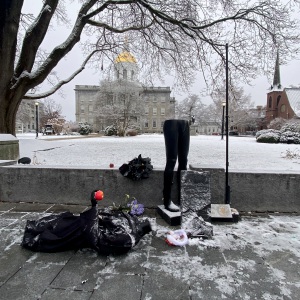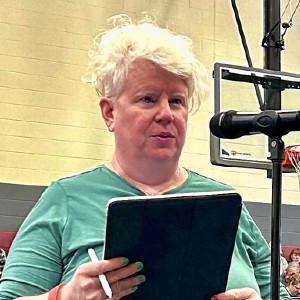School districts face conflicting guidance following Trump transgender sports executive order

Protesters wear pink armbands on the sidelines of the Bow girls soccer game on Tuesday, September 24, 2024. GEOFF FORESTER
|
Published: 02-24-2025 9:50 AM
Modified: 02-24-2025 10:22 AM |
In the weeks since President Donald Trump issued an executive order aimed at barring transgender girls and women from participating on female sports teams, New Hampshire school districts have been flooded with a flurry of conflicting guidance about how to proceed.
Last week, the New Hampshire Interscholastic Athletic Association rescinded a bylaw that had directed school districts to determine a student’s eligibility based on their “gender identification,” citing Trump’s order.
The bylaw change does not explicitly bar transgender girls from participating on girls’ teams; however, a memo from the NHIAA noted that “schools remain responsible for ensuring compliance with state and federal law.”
That decision followed guidance days earlier from the New Hampshire School Boards Association that recommended member school boards choose between two policies – one that appeared in line with the Trump order and one that did not address the issue.
“Because there are very significant risks inherent with choosing one or the other and the extent or scope of those risks will depend on local circumstances, NHSBA strongly encourages local boards to consult with their private legal counsel” prior to making a decision, the advisory stated.
Both policies, however, stated that student-athletes must comply with NHIAA rules.
Barrett Christina, the executive director of NHSBA, said in a brief interview that the organization is aware of the NHIAA bylaw change but that it had yet to do a “deep dive” into the implications of the change or issue any updated guidance.
The legal landscape school districts and governing bodies in New Hampshire face with respect to a transgender sports ban is exceedingly complicated. In addition to the Trump order, it includes a state law passed last year barring transgender girls from participating on girls’ teams, a pending federal court case in New Hampshire challenging both that law and Trump’s order and a federal court decision in Kentucky that vacated Title IX regulations passed during the Biden administration.
Article continues after...
Yesterday's Most Read Articles
 Police: Cache of drugs, gun seized in search
Police: Cache of drugs, gun seized in search
 ‘Like my child had died’: For parents trying to help their kids, New Hampshire’s mental health system forces a hard decision
‘Like my child had died’: For parents trying to help their kids, New Hampshire’s mental health system forces a hard decision
 Blasting set at Swenson Granite quarry, which may resume full operations this summer
Blasting set at Swenson Granite quarry, which may resume full operations this summer
 House committee defunds relief program for mothers and children, spares SNAP incentives
House committee defunds relief program for mothers and children, spares SNAP incentives
 Three arrested in connection with vandalism of Satanic Temple holiday display
Three arrested in connection with vandalism of Satanic Temple holiday display
 Zach Emerson, a cross-country innovator leaving a lasting impact on Hopkinton
Zach Emerson, a cross-country innovator leaving a lasting impact on Hopkinton
“Given the confluence of multiple executive orders and court orders, we’re advising school districts to be very cautious with how to proceed,” Christina said.
There are three school districts in the state that have transgender girls who have publicly said they wish to play on girls sports teams.
Two of them – Pemi-Baker and Pembroke – are embroiled in a federal lawsuit filed by the students who attend their high schools. In September, Judge Landya McCafferty issued a preliminary order finding that the state law likely violates both Title IX and the U.S. Constitution. McCafferty ordered the school districts and Department of Education to continue to allow the students to play on girls’ sports teams while the case proceeds.
Diane Gorrow, an attorney for the Pemi-Baker School District, said in a statement Friday that the NHIAA bylaw change has no bearing on that order.
“The District is required to permit Parker to play on the girls team by order of the court,” Gorrow wrote, referring to Parker Tirrell, a sophomore at Plymouth Regional High School.
An attorney for the Pembroke School District did not respond to a question about whether his client is taking the same approach.
Last week, Tirrell and the other plaintiff in the case, Iris Turmelle, amended their initial lawsuit to also challenge Trump’s executive order.
The GLBTQ Legal Advocates & Defenders, one of the groups representing the two teenagers, issued a statement this week criticizing the NHIAA’s decision.
“This is an unfortunate reversal of what had been a well-working NHIAA policy that allowed transgender girls to participate on school teams with their peers,” wrote Ben Klein, the organization’s senior director of litigation.
“It’s important to note, however, that the NHIAA has not prohibited schools from allowing transgender girls to play sports,” Klein added. “They have essentially decided to have no policy in light of the chaos and confusion caused by the executive order and are looking to the Court to address the issue.”
The third school district most directly effected by this legal upheaval is Kearsarge Regional, which has a transgender girl who has not brought litigation.
The Kearsarge school board had initially declined to follow the state ban, but days after the Trump executive order was issued, superintendent John Fortney said in an interview that the district had reversed course.
“We’ll follow the directives given by Title IX,” Fortney said, announcing the district had “adjusted practices internally.”
Every school district — whether or not it currently has a transgender girl who wishes to play on a girls’ team — must by law implement a policy surrounding eligibility for interscholastic athletics.
In September, the School Boards Association had issued guidance to members that discussed what they characterized as the “inherent conflict” between the new state law and Biden administration Title IX regulations, which had broadened the scope of Title IX to prohibit discrimination on the basis of gender identity.
In January, however, a Kentucky judge vacated those changes. The Trump order, which called on the Department of Education to withdraw federal funding from schools that “deprive women and girls of fair athletic opportunities,” followed on Feb. 5.
Despite the court and executive orders, the School Boards Association wrote in a policy update summary that school districts remain in a tough spot legally due to the federal court decision in New Hampshire.
“Because the [New Hampshire] Court’s order did not involve the 2024 Title IX Regulations, the fact that those regulations have been nullified has no bearing on the case,” the update stated. “Unfortunately, what this means is that districts with interscholastic sports remain in the unenviable position of needing to choose between complying with HB1205 and the Executive orders, or with the interpretation of the federal court.”
Jeremy Margolis can be contacted at jmargolis@cmonitor.com.







 Henniker ponders what is a ‘need’ and what is a ‘want’
Henniker ponders what is a ‘need’ and what is a ‘want’ Boscawen residents vote to fund major renovation of public works building
Boscawen residents vote to fund major renovation of public works building ‘Voting our wallets’: Loudon residents vote overwhelmingly against $1.7M bond for new fire truck
‘Voting our wallets’: Loudon residents vote overwhelmingly against $1.7M bond for new fire truck In Pembroke, Education Freedom Accounts draw debate, voters pass budget
In Pembroke, Education Freedom Accounts draw debate, voters pass budget
